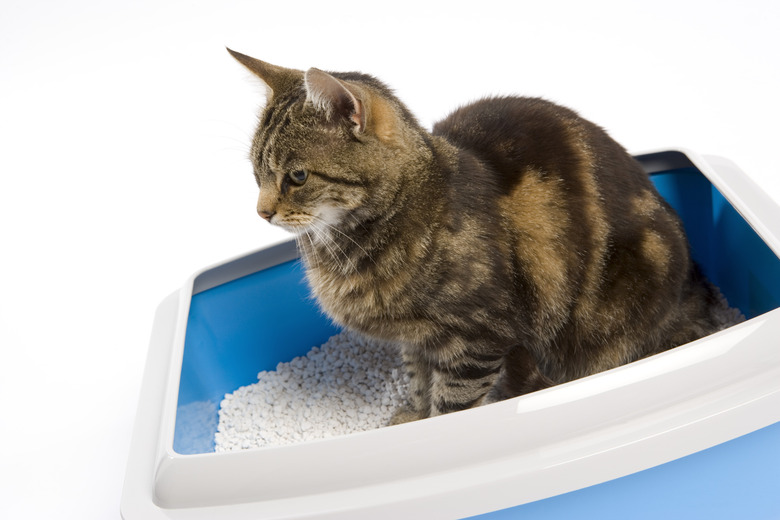Home Remedies To Deodorize Cat Litter
Litter box odor is a problem cat lovers have to face. Luckily it's a problem that can be combated effectively using proper cleaning and deodorizing techniques. To treat litter box odors, the litter, the litter box, the air, the floor and the room all must be treated.
Urine odors, whether from cats, dogs, other pets or humans, come from two basic components of the urine: urochrome and uric acid. Urochrome is the sticky substance which gives urine its color. Uric acid contains salts, crystals, and smells of ammonia. Most household cleaning products cause these to solidify, making he urine bond to the material it is in or on.
White Vinegar
White Vinegar
Vinegar is touted for all types of cleaning projects and can eliminate urine smells as well, if used properly. Each time you empty the litter box, rinse it out and spray it with a solution of three parts vinegar to one part water and allow this to dry before adding new litter.
Baking Soda
Baking Soda
If the empty litter box still smells after one or two sessions with the vinegar, try spraying the bottom with the vinegar solution and then sprinkle a thin layer of baking soda and allow it tor dry. Place cat litter on top of the baking soda. Rinse and scrape the baking soda out the next time the litter box is changed and repeat.
Enzyme Solutions
Enzyme Solutions
Several enzyme solutions for odor control are on the market. These are usually organic and safe for pets and children and can be purchased full strength or prediluted in a spray bottle. If purchased full strength, dilute one part enzyme product to three parts distilled water and place in a spray bottle. Spray the inside of the freshly rinsed out, empty litter box and the floor around the litter box and allow to dry. Use distilled water for diluting the product or the enzymes might react with the pollutants and sediments in the tap water, which could reduce the product's effectiveness.
Pine Products
Pine Products
Pine littler products work for some cats in removing the odors. However, many cats dislike the feel of the pine litter. Try mixing just a handful of the pine pellets in the cats regular litter.
Scoop Daily
Scoop Daily
In addition to scoop-able clay litters, scoop-able litters made from wheat, corn, and newspaper do exist and these can perform better at absorbing the smells.
The smells can be further avoided by scooping the litter every time the room is entered. This means two or three times per day. Self scooping or filtering litter boxes can make this less of a chore.
Tricks for Clay litter
Tricks for Clay litter
Regular clay litters can look clean and dry while the urine is setting at the bottom of the box smelling up the place. Fight this by using a small amount of activated carbon or ammonia-absorbing granules, usually found in pet stores for the filtration systems of aquariums. Some brands produce low dust, finely granulated products. Just a handful or a cup of these mixed into a regular or large sized litter box can help absorb odors and the ammonia found in urine.
Tricks for the Floor
Tricks for the Floor
More smells are removed when cleaning the liter box by treating the floor and underside of the box. The diluted vinegar or enzyme spray works for destroying the odors. After it dries, a pine or oil soap can be used to clean the floor so that the cat associates the vinegar-enzyme smell with the box and the floor cleaner with the floor.
Tricks for the Air
Tricks for the Air
When cleaning the litter box and the area around it, the scent can linger, even if the box and floor smell pleasant. These odors can be combated using a small air purifier with a heppa-seal and carbon filtration system. Simply leaving a very small unit in the area running at all times can remove the smell on an ongoing basis and keep it from spreading.
The air can be treated by leaving a bowl of water out with a few drops of one or two essential oils in it. The water should be in a place where the pet cannot drink from it so that they do not get sick by ingesting the essential oils. Some effective odor controlling essential oils include: lavender, lemon, lime, orange, pine, cedar, bergamot, tea tree, and eucalyptus.
A vinegar and essential oil room spray can be made to combat the smells. Mix one part white or apple cider vinegar with ten parts distilled water and ten drops of one essential oil such as lavender, lemon, lime, or orange. When done cleaning the area, spray this as a mist in the air and on any textiles such as shower curtains or window treatments.
The Diet
The Diet
Litter box odors, especially fecal odors, can be eliminated by changing the cat's diet. Pet foods containing large amounts of grains, fish, beef, and carbohydrates can leave lingering odors as they are improperly digested by the cat. Switching to a food which contains probiotics, enzymes, and poultry and which is beef-, fish-, and grain-free can work wonders at improving the urine and fecal odor problems in the litter box.
Litter Box Deodorizing Products
Litter Box Deodorizing Products
Several litter box deodorizing products exist on the market. These normally contain baking soda, ammonia absorbing crystals, and enzymes. They work when used properly for keeping the litter box clean between weekly litter changes.
Never use household cleaning products, ammonia, baby powder, room deodorizers or carpet deodorizer as these cause serious health problems for the cat.
Talcum powder, and dust from these products can enter the cat's lungs, causing respiratory ailments, allergies and cancer. Also, when the cat licks them off its paws they can enter the bloodstream and cause immune suppression, organ failure, cancer or digestive disorders. Only use deodorizing products designed for pets.
